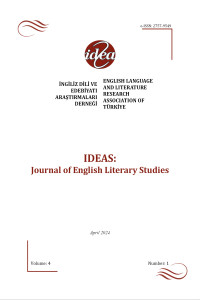Abstract
Shakespeare and Sartre have a specific bond in that the Bard portrayed the kind of tragic characters that can be the embodiment or conceptualization of existential notions. The present research intends to investigate the relations of two consciousnesses or the Sartrean inter-subjectivity as depicted in Macbeth and between its tragic heroes and others. Others have a great impact on Macbeth’s consciousness and his process of self-formation. When he chooses to commit murder, he attempts to conceal his crimes from others to shun the heavy sense of shame and self-disgust (guilt) created through what Sartre calls the concept of the Look and its alienating effect upon the individual. Macbeth's social self (being-for-others), which is portrayed in his outward relations with others, is in stark contrast with his subjective self (being-for-itself), which is displayed in his myriad reflections in his soliloquies and asides. The Macbeths assume a mask to conceal their real self from others’ consciousnesses. This article first explains the concepts of inter-subjectivity and the Look in Sartre's philosophy, and then it discusses the same notions in the context of Shakespeare's Macbeth.
References
- Ansari, Asloob Ahmad. The Existential Dramaturgy of William Shakespeare. The Edwin Mellen, 2010.
- Bradley, Andrew C. Shakespearean Tragedy Lectures on Hamlet, Othello, King Lear, Macbeth. 2nd ed., Macmillan, 1924.
- Bloom, Harold. Bloom’s Modern Critical Interpretations William Shakespeare’s Macbeth. New edition, Infobase, 2010.
- Boleyn, Vivian. The Existential Macbeth. Ball State University, 8 May 1972, https://cardinalscholar.bsu.edu/server/api/core/bitstreams/57e3ec54-7ed4-46fe-af81-aaa80c6dfdac/content. Accessed 4 Feb. 2024.
- Detmer, David. Sartre Explained from Bad Faith to Authenticity. Carus, 2008.
- Fernie, Ewan. Shame in Shakespeare. Routledge, 2002.
- Honigmann, E. A. J. Shakespeare: Seven Tragedies Revisited: The Dramatist’s Manipulation of Response. Palgrave, 2002.
- Howell, Maria L. Manhood and Masculine Identity in William Shakespeare’s The Tragedy of Macbeth. UP of America, 2008.
- Huang, Min. “A Battle Against One’s Soul: An Analysis of Lady Macbeth’s Functions as the Other Self to Macbeth.” International Journal of English Linguistics, vol. 12, no. 5, 2022, pp. 89–94. doi:10.5539/ijel.v12n5p89.
- Hughes, Daniel E. “The ‘Worm of Conscience’ in Richard III and Macbeth.” The English Journal, vol. 55, no. 7, 1966, pp. 845–52. doi:10.2307/812167.
- Kabal, Lamia. “Macbeth’s Conscience and Moralizing Imagination.” International Journal of Social Sciences and Education Research, vol. 1, no. 3, 2015, pp. 851–64. doi:10.24289/ijsser.279163.
- Mousley, Andy. Re-Humanising Shakespeare: Literary Humanism, Wisdom and Modernity. Edinburgh UP, 2007.
- Sartre, Jean-Paul. Being and Nothingness. Translated by Sarah Richmond. Routledge, 2018.
- Shakespeare, William. The Arden Shakespeare Complete Works. Edited by Richard Proudfoot et al. The Arden Shakespeare, 2021.
Abstract
Shakespeare ve Sartre arasında, Shakespeare’in varoluşsal kavramların bedenlenmesi veya kavramsallaştırılması olarak ele alınabilecek trajik karakterleri tasvir etmesi açısından özel bir bağ vardır. Bu çalışma, Macbeth oyununda tasvir edildiği şekliyle ve oyundaki trajik kahramanlar ile diğer karakterler arasındaki iki bilinç veya Sartrecı öznelerarası ilişkileri incelemeyi amaçlamaktadır. Diğer karakterler Macbeth’in bilinci ve kendini oluşturma süreci üzerinde büyük etkiye sahiptir. Cinayet işlemeyi seçtiğinde, Sartre’ın Bakış kavramı ve bunun birey üzerindeki yabancılaştırıcı etkisi olarak adlandırdığı şeyin yarattığı ağır utanç ve kendinden tiksinme (suçluluk) duygusundan kaçınmak için suçlarını diğerlerinden gizlemeye çalışır. Macbeth’in başkalarıyla dış ilişkilerinde tasvir edilen toplumsal benliği (başkaları için varlık), tiradlarda ve aparlarda gözlemlenip sayısız düşüncesinde sergilenen öznel benliğiyle (kendisi için varlık) tam bir tezat içindedir. Macbethler gerçek benliklerini başkalarının bilinçlerinden gizlemek için bir maskeye bürünürler. Bu makalede öncelikle Sartre’ın felsefesindeki öznelerarasılık ve Bakış kavramları açıklanmakta, daha sonra aynı kavramlar Shakespeare’in Macbeth oyunu bağlamında tartışılmaktadır.
References
- Ansari, Asloob Ahmad. The Existential Dramaturgy of William Shakespeare. The Edwin Mellen, 2010.
- Bradley, Andrew C. Shakespearean Tragedy Lectures on Hamlet, Othello, King Lear, Macbeth. 2nd ed., Macmillan, 1924.
- Bloom, Harold. Bloom’s Modern Critical Interpretations William Shakespeare’s Macbeth. New edition, Infobase, 2010.
- Boleyn, Vivian. The Existential Macbeth. Ball State University, 8 May 1972, https://cardinalscholar.bsu.edu/server/api/core/bitstreams/57e3ec54-7ed4-46fe-af81-aaa80c6dfdac/content. Accessed 4 Feb. 2024.
- Detmer, David. Sartre Explained from Bad Faith to Authenticity. Carus, 2008.
- Fernie, Ewan. Shame in Shakespeare. Routledge, 2002.
- Honigmann, E. A. J. Shakespeare: Seven Tragedies Revisited: The Dramatist’s Manipulation of Response. Palgrave, 2002.
- Howell, Maria L. Manhood and Masculine Identity in William Shakespeare’s The Tragedy of Macbeth. UP of America, 2008.
- Huang, Min. “A Battle Against One’s Soul: An Analysis of Lady Macbeth’s Functions as the Other Self to Macbeth.” International Journal of English Linguistics, vol. 12, no. 5, 2022, pp. 89–94. doi:10.5539/ijel.v12n5p89.
- Hughes, Daniel E. “The ‘Worm of Conscience’ in Richard III and Macbeth.” The English Journal, vol. 55, no. 7, 1966, pp. 845–52. doi:10.2307/812167.
- Kabal, Lamia. “Macbeth’s Conscience and Moralizing Imagination.” International Journal of Social Sciences and Education Research, vol. 1, no. 3, 2015, pp. 851–64. doi:10.24289/ijsser.279163.
- Mousley, Andy. Re-Humanising Shakespeare: Literary Humanism, Wisdom and Modernity. Edinburgh UP, 2007.
- Sartre, Jean-Paul. Being and Nothingness. Translated by Sarah Richmond. Routledge, 2018.
- Shakespeare, William. The Arden Shakespeare Complete Works. Edited by Richard Proudfoot et al. The Arden Shakespeare, 2021.
Details
| Primary Language | English |
|---|---|
| Subjects | Reinessance Literature |
| Journal Section | Research Articles |
| Authors | |
| Publication Date | May 23, 2024 |
| Submission Date | February 4, 2024 |
| Acceptance Date | April 4, 2024 |
| Published in Issue | Year 2024 Volume: 4 Issue: 1 |
IDEAS: Journal of English Literary Studies is published by The English Language and Literature Research Association of Türkiye (IDEA).


